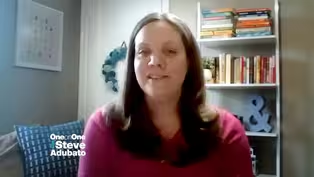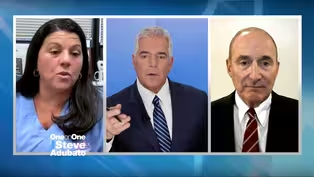One-on-One
Editor of TAPinto Newark Talks About Local Media and Crime
Clip: Season 2024 Episode 2712 | 9m 17sVideo has Closed Captions
Editor of TAPinto Newark Talks About Local Media and Crime
Steve Adubato is joined by Mark Bonamo, Editor of TAPinto Newark, to talk about the significance of the media in making informed decisions, protecting our democracy, and the reality of crime in Newark.
Problems playing video? | Closed Captioning Feedback
Problems playing video? | Closed Captioning Feedback
One-on-One is a local public television program presented by NJ PBS
One-on-One
Editor of TAPinto Newark Talks About Local Media and Crime
Clip: Season 2024 Episode 2712 | 9m 17sVideo has Closed Captions
Steve Adubato is joined by Mark Bonamo, Editor of TAPinto Newark, to talk about the significance of the media in making informed decisions, protecting our democracy, and the reality of crime in Newark.
Problems playing video? | Closed Captioning Feedback
How to Watch One-on-One
One-on-One is available to stream on pbs.org and the free PBS App, available on iPhone, Apple TV, Android TV, Android smartphones, Amazon Fire TV, Amazon Fire Tablet, Roku, Samsung Smart TV, and Vizio.
Providing Support for PBS.org
Learn Moreabout PBS online sponsorship(upbeat music) - Hey folks, Steve Adubato.
Way more importantly, my media colleague, Mark Bonamo, who is the Editor of TAPinto Newark, also a stringer/contributor to "The New York Times."
(fingers snap) Hey, good to see ya, Mark.
- Good to see you.
How you doing today?
- I'm doing great.
Hey Mark, tell everyone what TAPinto is overall and we'll put up the website for TAPinto Newark.
Go ahead.
- Right.
TAPinto Newark is a regional network of local news websites that are spread throughout New Jersey.
TAPinto has basically been formed because local news has suffered over the years.
Some of the larger media entities in New Jersey have cut back on their local coverage.
What TAPinto is trying to do is stand in the breach and provide the local news that local communities need throughout the state.
Your view, Mark, as a long time media professional, who understands, and also, Mark does a program on MY9 called "New Jersey Now," if I'm not mistaken, - Right.
- every Sunday, every Sunday at noon.
You understand the media television side.
You understand the digital side.
You understand the print side with "The New York Times."
How do you see, quote, "The role of media," not just in the 2024 election, but the role of of media, different forms of media, in terms of protecting our very fragile and endangered democracy?
Loaded question, I know, - Right.
A particularly loaded statement right now, what you're asking, but media is fundamental to a healthy, thriving democracy.
Because voters need, as much as possible, to have as much education and information as possible when they go to the voting booth.
Also, the media plays an important role in shining a light on parts of our society, and even parts of our government, that don't want to be transparent.
They don't want you to see what they're doing because oftentimes, they're not necessarily up to anything that's any good.
Media plays an important role in showing people the ins and outs of our public discourse, of our public life, so they can know going forward how to best protect democracy through the vote, through speaking out, and any other way they can imagine.
- So with TAPinto Newark, the kinds of issues...
I mean, again, check out our interviews with Newark Mayor Ras Baraka.
We're not a local news program, a local program, but at the same time, Newark is the largest, no matter what the folks in Jersey City say, still the largest city with the largest population in the state of New Jersey.
And my dad, my late dad used to say, along with the late Mayor Ken Gibson, "Where America is going, Newark will get there first."
And they were really talking about urban communities.
Where do you see, quote, "Newark?"
And there are lots of Newarks.
You and I had breakfast recently.
We were talking about how complicated Newark is.
Where do you see Newark in 2024?
What does it have going for it and what are its biggest challenges?
Please, Mark.
- I think what it has going for it is that, because of the ongoing revitalization of the city, in many ways the city is being rebranded.
Newark always struggles from the shadow of 1967, a riot to some, a rebellion to others.
And many people are still somewhat cowed by the idea of Newark, afraid of it.
But when you go to Newark, when you see what's happening on the street every day, you see the buildings going up.
You see, in many ways, the police working effectively with the community, not in an adversarial way.
There is an undercurrent of it's still a struggle, but there's hope that things are already better and can get better in the future, no matter what changes are to come, particularly in terms of development in this city.
- Talk about crime in the city.
I know the mayor, Mayor Baraka will talk about crime statistics, and no disrespect to those in elective office, but I've heard so many different interpretations or ways to engage in the methodology that often produces results as it relates to crime that inures to the benefit of public officials.
It's a loaded way of saying I don't know if I trust the stats, and my question is, what do you believe, as a reporter and journalist who covers Newark on a regular basis, what do you think the reality of violent crime is in Newark?
- The reality, it's like cities anywhere.
It could move from block to block.
Now, the city is divided into five wards, North, East, Central, West, South.
And in many ways, you could get a different result, depending on what ward you're in.
Many times, you might see more gang violence in the South Ward.
The East Ward, the Ironbound, which many people feel for a long time is a safer ward, known for its restaurants, you'll still see a lot of petty crime on the street.
Increasing problems with, unfortunately, the mentally ill in our society haven't been accommodated well enough just like you'll see in the homeless population.
It depends a lot of your impression as to what's going on.
Also, the police can't be everywhere all the time.
One of the fundamental things people always talk about with the police is, are there enough?
When you're constantly moving the police around to try to deploy them as effectively as possible, some neighborhoods are always gonna feel a short shrift.
But this is the reality of dealing with crime in, as you say, the state's largest city, where resources aren't always there.
- Mark are the feds still, is the federal government still monitoring, in control of, on some level, the Newark Police Department?
- There's still a relationship going forward in terms of that monitoring because, again, of some of the, you could say the past sins of what's happened in previous police procedures throughout the city.
The idea though that there is the monitoring going on, you can already see some benefit to that.
You saw it- - You're talking about racial profiling, Mark, sorry for interrupting.
You're talking about racial profiling?
- Yes.
- You're talking about a police force that, again, you go back in the history of Newark, the history is it was a corrupt police department - Yes.
- for many years.
- And proven.
- And back in the '70s, the mayor of Newark, who went to jail, Hugh Addonizio, had a police chief, Dominick Spina, - Yeah.
- a criminal.
- Right.
- And a corrupt police department.
Fast forward.
And also, Blacks and Hispanics were disproportionately arrested and harassed and treated very differently.
How much progress have we made in that regard, A, and B, how much of the police force reflects the population in the City of Newark, which is largely Black and Brown?
- You talk about the era of Addonizio and Spina.
There was a book written around in that time by a man named Ron Porambo, who was a local journalist.
Name of the book was "No Cause for Indictment."
And he expressed frustration because all these malpractice that was being committed by the police at the time, all that corruption, hadn't been effectively addressed.
Part of the monitoring program is an attempt to finally address these wrongs that had happened over decades.
You've already seen some improvement in relationship between the community and the police, which was, for a long time, largely adversarial.
You saw it during the George Floyd protests.
- That's right.
- You saw, again, the police standing back, letting the protestors express their viewpoint.
The protestors, at the same time, trying not to agitate the police too much.
Partially that's because of increased oversight of the police department, also because nobody wants 1967 to ever happen again.
Another way to ensure a situation like that doesn't happen again and people begin to trust the police, the police needs to look like them.
This is a city that is about 47 to 50% African American, 37% Latino and rising, about 10% white European.
That needs to be reflected in the police force, and increasingly you see that.
So if you see people who look like you, you are less likely to feel oppressed.
- Mark Bonamo, who is editor of TAPinto Newark, a contributor/stringer at "The New York Times."
And we thank you, Mark, for joining us.
We appreciate it, my friend.
- Thank you very much.
Great to be here.
- You got it.
Stay with us, We'll be right back.
- [Narrator] One-On-One with Steve Adubato is a production of the Caucus Educational Corporation.
Celebrating 30 years in public broadcasting.
Funding has been provided by New Jersey Institute of Technology.
PNC Foundation.
The North Ward Center.
The New Jersey Education Association.
RWJBarnabas Health.
Let’s be healthy together.
New Jersey Sharing Network.
The Turrell Fund, a foundation serving children.
The Healthcare Foundation of New Jersey.
And by NJM Insurance Group.
Promotional support provided by NJ.Com.
And by ROI-NJ.
- I’m very grateful that I’m still here.
- That’s me and my daughter when we went to celebrate our first anniversary.
- With a new kidney I have strength.
- They gave me a new lease on life.
- I’m still going everywhere and exploring new places.
- Nobody thought I was going to be here, nobody.
- I look forward to getting older with my wife, that’s possible now.
- [Narrator] We’re transforming lives through innovative kidney treatments, living donor programs, and world renowned care at two of New Jersey’s premiere hospitals.
- They gave me my normal life back.
It’s a blessing.
- [Narrator] RWJBarnabas Health.
Let’s be healthy together.
Audiobooks and Their Impact on Literacy and Comprehension
Video has Closed Captions
Clip: S2024 Ep2712 | 8m 19s | Audiobooks and Their Impact on Literacy and Comprehension (8m 19s)
Better Dental Health Options for People with Disabilities
Video has Closed Captions
Clip: S2024 Ep2712 | 10m 32s | Better Dental Health Options for People with Disabilities (10m 32s)
Providing Support for PBS.org
Learn Moreabout PBS online sponsorship
- News and Public Affairs

Top journalists deliver compelling original analysis of the hour's headlines.

- News and Public Affairs

FRONTLINE is investigative journalism that questions, explains and changes our world.












Support for PBS provided by:
One-on-One is a local public television program presented by NJ PBS

